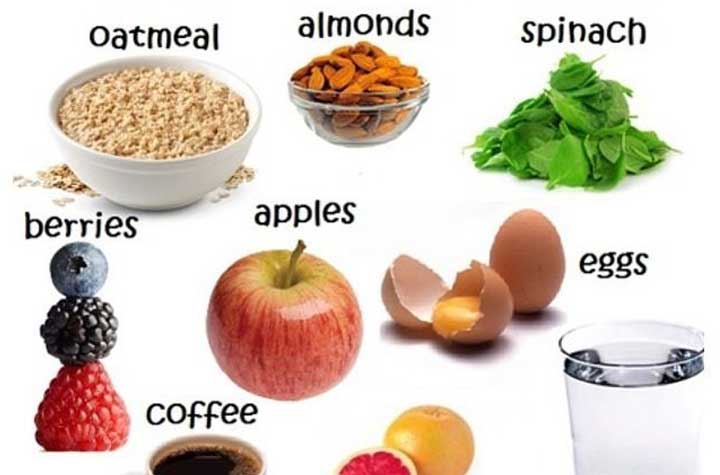
Calories aren′t the only things that count when it comes to a jaw-dropping body: If you aren′t eating the right nutrients, you aren′t going to slim down or build strong, sexy muscles.
See, every time you curl or press, you′re actually breaking down your muscles, causing microtears in the fibers. It′s when you′re resting that your body rebuilds and strengthens your muscles—and in order do so, they need the proper fuel, including these seven vitamins and minerals, identified by experts as a sort of menu for muscle. Follow the pros′ recommendations for getting your daily dose of each through food or supplements, and you′ll see and feel a difference from head to toe.
Adding color to your plate may help you add definition to your arms. Vitamin C—found in all fruits and vegetables—"is responsible for the health of the blood vessels, which support the muscles′ needs for oxygen and nutrients," says John Cuomo, Ph.D., of USANA Health Sciences, a company that develops and manufactures nutritional supplements. And the better stocked your muscles are, the better they can work and the quicker they recover. Orthopedic surgeon Leon Popovitz, M.D., of NY Bone and Joint Specialists, adds that vitamin C is a building block of collagen, a material that your body then uses to build bones and muscles.
How much? The National Institutes of Health recommends 75 mg daily, which you can get from a medium orange, half a red bell pepper, or a cup of strawberries.
With the ability to enhance the effects of weight training by increasing blood flow to the muscles, reducing muscle protein breakdown, and decreasing inflammation for faster recovery, Cuomo says we should think of omega 3s—the fatty acids found in fish oil—as a secret weapon for toning up. It doesn′t hurt that omega-3 fatty acids also improve insulin sensitivity, which helps prevent diabetes.
How much? The American Heart Association recommends eating two 3.5-ounce servings of fatty fish (such as salmon, mackerel, herring, lake trout, sardines, or albacore tuna) each week. If fish make you gag, consider a 1,000- to 3,000-milligram (mg) supplement of DHA and EPA a daily. Vegetarians and vegans can find omega-3s in flax seed, chia seeds, hemp seeds, walnuts, and algae-based supplements.
"Calcium is one of the two most important nutrients our body needs for healthy and strong bones and muscles," Dr. Popovitz says. Every time you lift a dumbbell, your muscle contracts, and this mineral gives muscles that cue to contract—and, therefore, grow.
How much? Dr. Popovitz recommends at least 1,200 mg a day. You can get your daily dose through foods like dairy products, green veggies, and fortified dairy-free milk, or a supplement. If you prefer a pill, choose one with D, which your body needs to absorb calcium. Stick to supplements with 500 to 600 mg of calcium and take them hours apart, as your body can only take in that much at a time.
While true magnesium deficiency is rare in the U.S., Dr. Popovitz says most women don′t get enough of this mineral. Not good since it keeps things humming when it comes to your muscles, in particular ensuring that your heart is thumping at a steady beat. Bonus: It′s great for helping alleviate muscle cramps and soreness, whether you′re achy from weight lifting or PMS.
How much? The National Institutes of Health recommends 310 to 320 mg a day, but Dr. Popovitz says there′s no harm increasing your intake to 400 mg if you are lifting weights three or more days a week. In addition to supplements, you can find magnesium in spinach, nuts, legumes, and whole grains, or soak it in via a relaxing epsom salt bath.
This gang includes B1 (thiamin), B2 (riboflavin), B3 (niacin), B6 (pyridoxine), B7 (biotin), and B12 (cobalamin), each essential for overall health but become even more important when you′re actively trying to grow muscle and get stronger, Cuomo says, as Bs play a role in everything from protein metabolism and energy production to maintaining healthy nerves and breaking down fat and carbs.
How much? Most people consume adequate amounts of the Bs through their diets, as these vitamins are found in foods such as whole grains, eggs, lean meats, legumes, nuts, leafy greens, and fortified cereals. However, B12 is only found in animal sources, so vegetarians and vegans may want to consider taking a supplement or using fortified foods and drinks to obtain 2.4 micrograms (mcg) daily.
From scientists in ivory towers to your corner pharmacist, it seems everyone is touting the powers of the "sunshine" vitamin. Its list of potential powers includes boosting mood, immunity, and muscle. "Vitamin D is required for muscular contraction, function, and growth," Cuomo says. It′s also essential for bone growth and strength, and since skeletal muscles need a strong base to build off of, you can′t neglect your D.
How much? Ideally you′d get adequate D through sun exposure, but then you′d have to worry about skin cancer. Take a supplement of 4,000 to 6,000 international units (IU) of D3 every day instead, Cuomo recommends, and if you are concerned, see your doctor for a simple blood test to measure you D levels and determine if you are deficient and need a higher dosage.
The handful of almonds you reach for after a workout not only provides protein, healthy fats, and fiber, it′s also a good source of vitamin E. "This antioxidant helps cell membrane recovery from oxidative stress, such as exercise," Cuomo says. And the fast your muscles recover, the faster they′ll grow.
How much? This is definitely one case where more is not better, as doses above 300 mg daily may lead to nausea, stomach pain, weakness, or even death. Stick closer to the recommended 15 mg a day by skipping supplements and eating nuts and seeds.